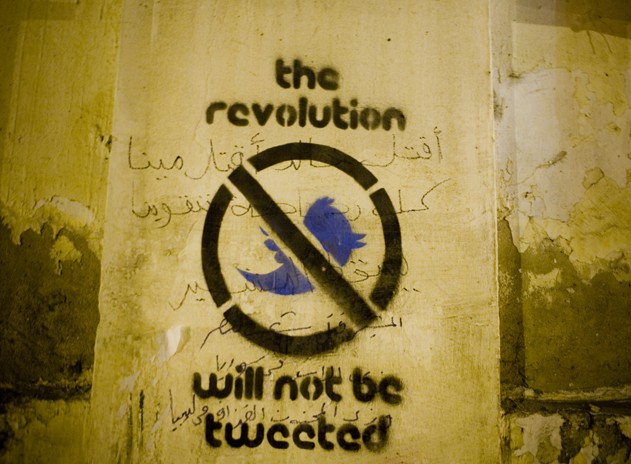Social media has been given the credit for protests from Occupy to the Arab revolutions. David Glanz looks at what it really means for activists and social movements
“Twitter is known for three things. It’s known for the Arab Spring, it’s known for Justin Bieber, and it’s known for narcissism.”
Caroline O’Donovan, staff writer at the Nieman Journalism Lab
Faced with events they can’t explain—or that they think their audience won’t understand—too many western media commentators choose to focus on novelty. In the case of the Arab Spring, that novelty was the use of social media.
Michael Short, writing in The Age earlier this year, summed up the mainstream position: “Social media was pivotally important in public uprisings that brought fundamental political and social change in several nations including Libya, Yemen, Tunisia and Egypt.”
Others went so far as to suggest social media activists in Egypt, or even Twitter or Facebook, deserved a Nobel Peace Prize.
There was, of course, a kernel of truth in the argument. As one Egyptian activist said: “We use Facebook to schedule the protests and Twitter to coordinate, and YouTube to tell the world.”
It’s a practice that Australian activists would recognise. Few protests today are called without the support of a social media presence. Some protests are publicised entirely through Facebook.
Socialists gladly embrace the potential each generation of technology offers. You may, after all, be reading this article online, after clicking on a Solidarity link in your Facebook feed. Or a friend may have retweeted the link and you’re reading this on your phone.
But new technology raises questions for the Left, too: does digital communication make printed materials redundant? Are online posts more effective than running street stalls or holding meetings? Why focus on talking to handfuls of your closest supporters when social media can give you access to thousands, potentially millions?
Communicating change
Media fascination with innovative communication channels is not new. When activists were organising against the World Economic Forum meeting in Melbourne on September 11, 2000, journalists were more excited to write about the S11 movement’s use of the amazing new thing called the internet than about the protesters’ aims.
Long before that, radio enthusiasts talked of how broadcasting “would encompass the world, bring universal harmony, make an end to loneliness and isolation”. One Belgian journalist wrote in 1923 that epochs should no longer be defined “by great wars and battles or by the rule of certain peoples or rulers” but by the development of “genial” technologies like radio.
Fifty years before that it was the telegraph that transformed daily life and ended the “tyranny of distance”. Australian colonists writing a letter to Britain could expect a reply six months later. The new technology cut the wait to 48 hours.
A generation earlier, it was an improvement to the design of the rotary printing press that allowed publishers to print millions of newspapers a day. A newspaper went from a luxury item accessible only to the ruling class to a working class staple, “often read aloud in homes … Significant speeches were sometimes printed in their entirety, giving politicians and social activists a much wider audience”.
Each invention opened up new horizons for spreading the word of resistance. But struggle against exploitation and oppression has never relied on technology.
News of the Eureka Stockade, the miners’ revolt on the Ballarat goldfields in 1854, was the first message sent by telegraph to Melbourne—the technology reported the struggle, but was not used to organise it. Radio broadcasts did not begin in Russia until 1921, four years after the workers’ revolution.
While the Left today should make full use of social media, there are two pitfalls that need to be avoided.
One is to treat the technology as neutral. This was how many greeted the advent of the internet—it would free information from corporate and government control, ushering in a new era of unfettered democracy.
The reality is that corporations have quickly moved to dominate the online experience. Google’s algorithms not only deliver a river of (lightly taxed) advertising profit, but determine how easy or hard it is to access information on the web.
Facebook’s strategy is to constantly reduce the reach of people’s posts, to force users into paying to ensure their messages are received. It may be a free platform for progressive causes, but Facebook also hosts a myriad of racist and sexist pages.
And behind the likes and emoticons, every post is potentially being spied upon. In the US, all phone calls and internet traffic may be subject to government scanning. To help with this, Google stores searchers’ IP addresses and search phrases for up to 18 months.
Changing consciousness
The other mistake is to assume that social media can substitute for the more humdrum processes involved in building movements.
Three thousand people signed up on Facebook for the Bust the Budget rally in Melbourne but tens of thousands turned up on the day. The difference came down to postering, leafleting and, most importantly, conversations between union delegates and activists and their workmates.
Capitalists understand why. Market research company Nielsen’s 2013 Trust in Advertising report found that word-of-mouth was still No. 1 for attracting new customers. Even online, recommendations from people known to potential customers carry more weight than the slickest advert.
Public relations authors Brian Solis and Deirdre Breakenridge put it this way: “Regardless of the technology, beneficial conversations are about trust, respect, mutual benefits, and positive experiences. We also can’t stress enough that the most rewarding dialogue has always been one-to-one rather than one-to-many.”
Given the billions spent on advertising through TV, radio and online, how can this be so?
The answer lies in a contradiction between two huge influences on workers’ opinions—on the one hand, the way in which the ideas of the ruling class dominate society and create a “common sense”, and the other the way that workers’ own experience cuts across the dominant messages.
In the era of newspapers and the telegraph, Karl Marx wrote: “The ideas of the ruling class are in every epoch the ruling ideas, i.e., the class which is the ruling material force of society, is at the same time its ruling intellectual force.”
In the era of Instagram and Netflix, online media and Pinterest—not to mention TV, radio and compulsory school education—there are ever more ways in which the rich can impose their values.
But it is not one-way traffic. Sections of the media might parrot the Liberals’ arguments justifying their budget attacks, but people know that $7 to visit the doctor will affect their families, or can calculate how deep their debt will be for attending university.
Workers join unions and sometimes take industrial action because they have learned that they cannot trust their employers, even if they grudgingly accept their control.
The result, as Italian revolutionary Antonio Gramsci wrote, is that the “average person” has “two theoretical consciousnesses (or one contradictory consciousness): one which is implicit in his activity and which in reality unites him with all his fellow workers in the practical transformation of the real world; and one…which he has inherited from the past and uncritically absorbed”.
The Left has to engage in this battle of ideas, to shift workers (in Gramsci’s words) from “common sense”—which accepts the logic of capitalism—to “good sense”, to consciousness of their interests as a class.
The British revolutionary Chris Harman wrote: “The struggle for ideological clarity and hegemony takes place at different levels. At one level it is the arguments that take place in the locality or the workplace. A key role is played here by people who have some basic conception of what a movement is fighting for and who its opponents are.
“These are the key to organising and influencing much larger numbers of people (just think of the role played today by trade union activists, shop stewards and workplace reps, or of those who try to mobilise against racism or war).”
Communicating change
Where does social media fit into this? The answer is that social media is like every other form of media—the level of trust that workers or students assign to the messages they consume depends to a large extent on who they already trust, and what they have already learned through their own experience.
A Facebook post may reach more people than a leaflet or this magazine, but whether people respond to that post depends partly on how deeply they feel about the issue, and partly on whether they think the person or group who posted the message are credible.
So when raw anger about an issue in the off-line world explodes, such as around the PNG refugee deal last year or the announcement of Tony Abbott’s horror budget, Facebook can provide a way to tap into and mobilise that sentiment.
At other times it can galvanise a more diffuse mood, such as the anger against Tony Abbott that fed into March in March.
But it cannot create such anger out of thin air. Nor is it so useful in sustaining campaigns, unions and social movements beyond these initial bursts of enthusiasm. This requires patient work building up activist networks, and building trust among different groups.
Real trust and credibility has to be built first and foremost in practical life—in the workplace, on the campus, and in campaigns—through direct interaction and one-on-one conversations, where leaflets and printed material remain crucial.
People whose formal politics are well to the right will vote for a socialist as union delegate if they are convinced that she or he is committed to their interests.
In campaigns, it is the activists who combine hard work with a vision of a way forward who will win leadership in contested issues.
In other words, in the battle of ideas, it’s not enough to be right. It’s not enough to be at the cutting edge of digital communication. You also need to earn the right to be listened to.






